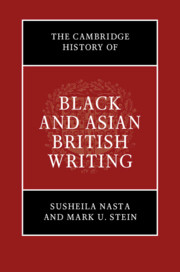Book contents
- The Cambridge History of Black and Asian British Writing
- The Cambridge History of Black and Asian British Writing
- Copyright page
- Dedication
- Contents
- Notes on Contributors
- Preface and Acknowledgements
- Introduction
- Part I New Formations
- Part II Uneven Histories
- Part III Writing the Contemporary
- (I) Looking Back, Looking Forward
- 26 Diasporic Translocations
- 27 Reinventing the Nation
- 28 Reclaiming the Past
- 29 Expanding Realism, Thinking New Worlds
- 30 Writing Lives, Inventing Selves
- 31 Black and Asian British Women’s Poetry
- (II) Framing New Visions
- Select Bibliography
- Index
27 - Reinventing the Nation
Black and Asian British Representations
from (I) - Looking Back, Looking Forward
Published online by Cambridge University Press: 19 December 2019
- The Cambridge History of Black and Asian British Writing
- The Cambridge History of Black and Asian British Writing
- Copyright page
- Dedication
- Contents
- Notes on Contributors
- Preface and Acknowledgements
- Introduction
- Part I New Formations
- Part II Uneven Histories
- Part III Writing the Contemporary
- (I) Looking Back, Looking Forward
- 26 Diasporic Translocations
- 27 Reinventing the Nation
- 28 Reclaiming the Past
- 29 Expanding Realism, Thinking New Worlds
- 30 Writing Lives, Inventing Selves
- 31 Black and Asian British Women’s Poetry
- (II) Framing New Visions
- Select Bibliography
- Index
Summary
This chapter explores the reinvention of the nation in black and Asian British writing since the late twentieth century. It situates this task in relation to two contrary influences that continue to influence the imagining of Britain at large: the comprehension of Britain as a multiracial country with a long history of migration and diversity, and those atavistic, illiberal, racially exclusive conceptions of the nation, also longstanding, which found their apotheosis in the ‘Brexit’ referendum result of 2016. It proceeds by considering how writers in the 1990s challenged Britain’s wilful ignorance of its dark imperial history by writing about the nation’s slaving past and its historical and cultural legacies. It considers, next, how writers at the beginning of the new millennium turned to Europe as a way of embedding a consciousness of postcolonial Britain’s in a strategically continental frame, not least to challenge Britain’s false sense of its splendid isolation from Europe. It closes by assessing how several writers portray the precarious condition of contemporary Britain as a neoliberal concern, but without fully giving up hope on the demotic, progressive potential of the idea of the nation as an instrument of inclusivity and democracy.
Keywords
- Type
- Chapter
- Information
- The Cambridge History of Black and Asian British Writing , pp. 453 - 467Publisher: Cambridge University PressPrint publication year: 2020
- 1
- Cited by

